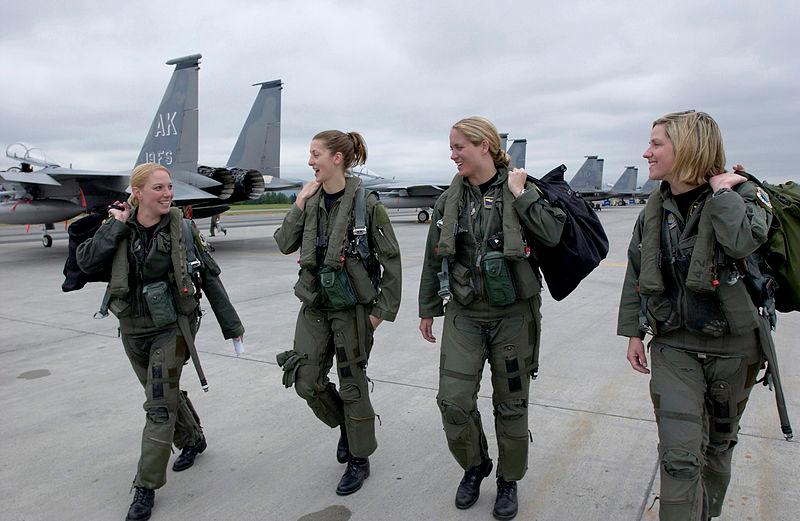U.S. military prepares to open more military roles to women
Four F-15 Eagle pilots walk to their jets at Elmendorf Air Force Base, Alaska, in 2006 for the final flight of Maj. Andrea Misener (far left). To her right are Capt. Jammie Jamieson, Maj. Carey Jones and Capt. Samantha Weeks. The U.S. military on Thursday
The Pentagon announced new rules this week that will allow women to serve closer to the front lines in the Army and the Marine Corps.
They’re slated to be implemented later this summer. The changes will allow women to serve in non-infantry jobs in battalions, such as being radio operators, intelligence analysts, medics, radar operators and tank mechanics. This could open up 14,000 new jobs for female soldiers and Marines. Women remain ineligible to serve in infantry, armored and special forces units.
But the changes aren’t exactly ground-breaking. Women have been serving in these roles on an ad hoc basis at least as long as the United States has been in Iraq and Afghanistan. And women in combat go back thousands of years.
Military analyst Paula Broadwell said this is certainly a positive development for women in the military.
“It takes baby steps to change an organization,” Broadwell said. “I think we could have made this move earlier, but the organization has been focused on fighting in Iraq and Afghanistan and now we’ve had a chance to pause and regroup and improve the health of the force.”
Broadwell said the changes have benefits in two primary areas. First, it provides some relief for men in the ranks. Second, it allows women opportunities for positions that will enable them to rise higher in the ranks.
Former Marine Anu Bhagwati, executive director of the Service Women’s Action Network, said the military’s history of advancing women speaks for itself. There’s been just one high-ranking woman in the U.S. military: Gen. Ann Dunwoody, current Commanding General, U.S. Army Materiel Command. A second woman, Lt. Gen. Janet C. Wolfenbarger, was just nominated for a fourth star this week, to head the U.S. Air Force Material Command.
“That really says a lot about career mobility for the average woman in the military in terms of leadership. We don’t see any women on the joint chiefs of staff, and that’s very telling,” Bhagwati said. “A lot of this has to do with the assignments that are off-limits to women today.”
Bhagwati said the current change was a positive one, but a small one. Because there are women who are qualified and want to be in the infantry.
“They still can’t be,” Bhagwati said.
Presidential candidate Rick Santorum said he has “concerns” about the decision, saying he’s concerned women will distract their male counterparts because of sexual tension.
Broadwell said Santorum may have a point, but that ship sailed a long time ago.
“Women are there. They’re serving in well-disciplined units and, my experience in the Army, has been if I’ve proven myself, the men welcome me. It’s about keeping standards, but setting the right command climate and tone in your unit and setting boundaries for yourself.”
But Broadwell said we also have to acknowledge there’s an epidemic of rape in the military. Women are more likely to be raped by a fellow service-member than to die in combat.
Bhagwati, however, said she doubts many of those sexual assaults — though certainly some — happen in the combat zone. Many, she said, happen in barrack in the United States or at bases in South Korea, or Japan or in Europe.
Our coverage reaches millions each week, but only a small fraction of listeners contribute to sustain our program. We still need 224 more people to donate $100 or $10/monthly to unlock our $67,000 match. Will you help us get there today?
